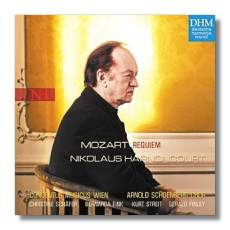
The Internet's Premier Classical Music Source
Related Links
- Mozart Reviews
- Latest Reviews
- More Reviews
-
By Composer
-
Collections
DVD & Blu-ray
Books
Concert Reviews
Articles/Interviews
Software
Audio
Search Amazon
Recommended Links
Site News
 SACD Review
SACD Review
Wolfgang Mozart

Requiem (ed. Beyer)
- Christine Schäfer, soprano
- Bernarda Fink, alto
- Kurt Streit, tenor
- Gerald Finley, bass
Arnold Schoenberg Choir
Concentus Musicus Wein/Nikolaus Harnoncourt
EMI Deutsche Harmonia Mundi 82876-58705-2 Hybrid Multichannel SACD 50:15
Harnoncourt has been performing this music literally since he was a child (don't forget that he began his career as a cellist), and he has recorded it at least once before. This new version, recorded "live" in Vienna between November 27 and December 1, 2003, is as close to definitive as one can get with this enticingly open-ended work.
In his highly personal booklet note, the conductor recounts how "harmless and sugary" interpretations of this work inspired him to put down his bow and take up a baton. A "requiem" is a plea for rest, but Death is given its sting – and then some! – in this new recording. Only in the "Hostias" (played as a very flowing Andante) are we given some slack, but when we reach the "Agnus Dei" we are back where we started: abandon all hope ye who enter here! If you are looking for a comforting Mozart Requiem, I cannot recommend Harnoncourt. If, however, you are looking for an intensely dramatic and gripping one, this is stern, severe, forbidding, intelligent, and crisply executed.
Harnoncourt has filled his interpretation with dramatic detail, expanding on the contrasts, particularly of dynamics, that Mozart (well, maybe Süssmayr) wrote into the score. A piano becomes a whispered pianissimo – a forte, an awesome fortissimo. Even though Harnoncourt has used his "original instruments" ensemble here (the Concentus Musicus) and a moderate-sized choir, the music, in all its uncompromising terror, definitely is looking in the direction of Romanticism. Only occasionally did I feel that Harnoncourt has taken things too far. For example, in the final "Lux aeterna," the chorus' clipped "Et lux aeterna" feels mannered and does not get better with repeated listenings.
The soloists are onboard with Harnoncourt's interpretation – they make beautiful sounds, but they understand that this is music about a soul in extremis. Bass Finley, while not black-voiced, is particularly impressive; his "Tuba mirum" finds him matching his sound to that of the trombonist.
I listened to this Super Audio CD on a regular CD player, and the sound was wonderful; I can only imagine how it sounds on an SACD unit. If you insert this disc into your personal computer, you can view Mozart's original, incomplete manuscript as you listen along – an interesting bonus, although it is difficult to read Mozart's handwriting.
Copyright © 2004, Raymond Tuttle




















